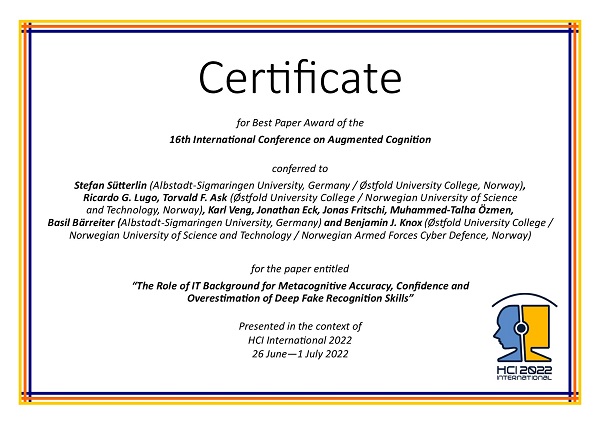
Certificate for Best Paper Award of the 16th International Conference on Augmented Cognition
The award has been conferred to
Stefan Sütterlin (Albstadt-Sigmaringen University, Germany / Østfold University College, Norway),
Ricardo G. Lugo, Torvald F. Ask (Østfold University College / Norwegian University of Science and Technology, Norway),
Karl Veng, Jonathan Eck, Jonas Fritschi, Muhammed-Talha Özmen, Basil Bärreiter (Albstadt-Sigmaringen University, Germany) and
Benjamin J. Knox (Østfold University College / Norwegian University of Science and Technology / Norwegian Armed Forces Cyber Defence, Norway)

Stefan Sütterlin
(presenter)
for the paper entitled
"The Role of IT Background for Metacognitive Accuracy, Confidence and Overestimation of Deep Fake Recognition Skills"
Presented in the context of
HCI International 2022
26 June—1 July 2022
Paper Abstract
"The emergence of synthetic media such as deep fakes is considered to be a disruptive technology shaping the fight against cybercrime as well as enabling political disinformation. Deep faked material exploits humans’ interpersonal trust and is usually applied where technical solutions of deep fake authentication are not in place, unknown, or unaffordable. Improving the individual’s ability to recognise deep fakes where they are not perfectly produced requires training and the incorporation of deep fake-based attacks into social engineering resilience training. Individualised or tailored approaches as part of cybersecurity awareness campaigns are superior to a one-size-fits-all approach, and need to identify persons in particular need for improvement. Research conducted in phishing simulations reported that persons with educational and/or professional background in information technology frequently underperform in social engineering simulations. In this study, we propose a method and metric to detect overconfident individuals in regards to deep fake recognition. The proposed overconfidence score flags individuals overestimating their performance and thus posing a previously unconsidered cybersecurity risk. In this study, and in line with comparable research from phishing simulations, individuals with IT background were particularly prone to overconfidence. We argue that this data-driven approach to identifying persons at risk enables educators to provide a more targeted education, evoke insight into own judgement deficiencies, and help to avoid the self-selection bias typical for voluntary participation."
The full paper is available through SpringerLink, provided that you have proper access rights.